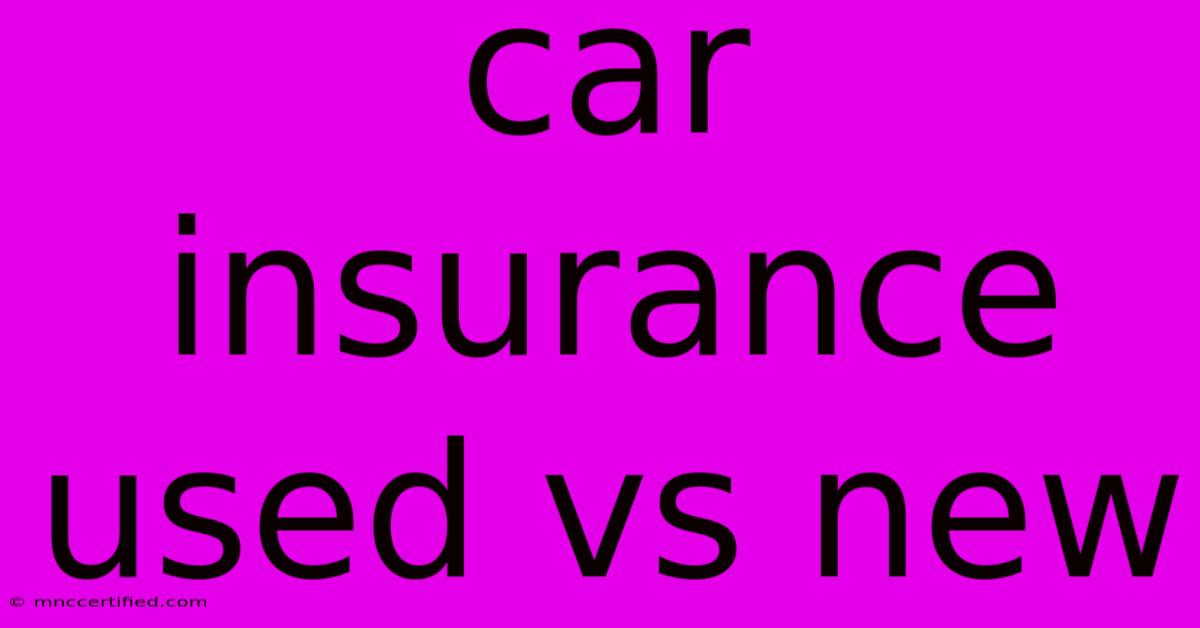Car Insurance Used Vs New

Table of Contents
Car Insurance: Used vs. New – What's the Difference?
Choosing between a new and used car is a big decision, impacting not only your monthly payments but also your car insurance premiums. Understanding the nuances of how insurance companies view these two categories is crucial for budgeting effectively. This comprehensive guide breaks down the key differences in car insurance for used versus new vehicles.
Factors Affecting Insurance Costs: Used vs. New
Several factors influence how much you'll pay for car insurance, regardless of whether your car is new or used. However, some are weighted differently depending on the age and value of your vehicle.
1. Vehicle Value: The Biggest Factor
This is the most significant difference. New cars depreciate rapidly. Their value plummets the moment you drive them off the lot. This means that your insurer's payout in case of a total loss will decrease significantly each year. Used cars, on the other hand, have already experienced most of their initial depreciation. Therefore, insurance for a new car is generally more expensive because the insurer is covering a higher replacement cost.
2. Safety Features: A Growing Influence
Modern cars often boast advanced safety features like lane departure warnings, automatic emergency braking, and adaptive cruise control. These features can significantly reduce your insurance premiums, regardless of whether the car is new or used. However, newer cars are more likely to have these features, offering a potential advantage in cost savings. Check your car's safety ratings from organizations like the IIHS and NHTSA; these can influence your premium.
3. Repair Costs: A Key Consideration for Newer Cars
New cars often require more specialized parts and labor for repairs, leading to higher repair costs. This translates to potentially higher insurance premiums, as the insurer must account for these increased expenses. Used cars, while still subject to repair costs, typically have lower repair bills due to the availability of cheaper, after-market parts.
4. Driver Profile: Always a Determining Factor
Your driving history, age, location, and even credit score play a substantial role in your insurance premiums. These factors remain consistent whether you drive a new or used car. A clean driving record and a good credit score can significantly reduce your insurance costs, regardless of your vehicle.
5. Insurance Coverage: Customize Your Protection
The type of insurance coverage you choose also affects the price. Comprehensive and collision coverage protect you from damage caused by accidents or non-collision events, while liability coverage protects others involved in an accident. Choosing higher coverage limits will generally increase your premiums, but provides greater financial protection. Carefully evaluate your needs when selecting your coverage levels.
Used Cars: Advantages and Disadvantages in Insurance
Advantages:
- Lower Premiums: Generally, used cars come with lower premiums due to lower replacement costs.
- Less Depreciation: The initial depreciation hit is already absorbed.
- Potentially Lower Repair Costs: Repairs might be cheaper due to the availability of used parts.
Disadvantages:
- Older Safety Features: May lack the advanced safety technologies found in newer models.
- Higher Risk of Mechanical Issues: Older cars are statistically more prone to breakdowns.
- Potential for Higher Deductibles: Some insurers may require higher deductibles for older vehicles.
New Cars: Advantages and Disadvantages in Insurance
Advantages:
- Latest Safety Features: Often equipped with advanced safety systems.
- Warranty Coverage: Manufacturer warranties can reduce repair costs.
Disadvantages:
- Higher Premiums: Reflecting the higher replacement value.
- Rapid Depreciation: Leading to quick decreases in the insured value.
- Higher Repair Costs: Specialized parts and labor can inflate repair bills.
Choosing the Right Insurance: Tips for Saving Money
- Shop Around: Compare quotes from multiple insurance providers.
- Bundle Policies: Combining car insurance with other policies (home, renters) can often lead to discounts.
- Maintain a Clean Driving Record: This consistently lowers your premiums.
- Consider Higher Deductibles: A higher deductible reduces your premium, but you pay more out-of-pocket in case of a claim.
- Explore Discounts: Many insurers offer discounts for safety features, good students, and more.
By understanding the factors that influence car insurance costs for both new and used vehicles, you can make an informed decision and choose the best coverage for your needs and budget. Remember to always shop around and compare quotes to secure the most favorable rates.

Thank you for visiting our website wich cover about Car Insurance Used Vs New. We hope the information provided has been useful to you. Feel free to contact us if you have any questions or need further assistance. See you next time and dont miss to bookmark.
Featured Posts
-
Agent Alliance Insurance Co
Dec 10, 2024
-
Does Gap Insurance Expire
Dec 10, 2024
-
Aoa Rubs Utilities Notice
Dec 10, 2024
-
Where To Watch Wolves Vs Chelsea
Dec 10, 2024
-
Scott Insurance Richmond Va
Dec 10, 2024